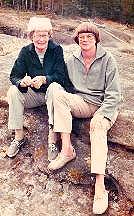
MARRIAGE?
The cage of coupledom
Lives of
our own invention
We have shaped richly varied ways to care for each other.
Why clamber for state-imposed rules?

Together -- with the world
Helen Sonthoff & Jane Rule at Sticks Allison Beach, Galiano, c 1984. (Photo: Betty Fairbank; photo above: Lynne Fernie, co-director with Aerlyn Weissman of Fiction and Other Truths, 1994.)
Jane Rule, regarded as an icon of lesbian literature, has long been a reluctant role model. Her pioneering novel The Desert of the Heart, published in Canada, Britain and the US in 1964, was followed by six more. And by five books of stories and essays, among them her 1975 Lesbian Images, looking at those images in the works of other writers, from Willa Cather and May Sarton to Radclyffe Hall and Gertrude Stein.
But Jane has been less concerned with image than, as she said in the 1994 documentary on her life and work, Fiction and Other Truths, with "bearing witness to the world we live in." On being seen as a model, she said there:
- "My own sense about role models is that you only need bad ones. You can say: 'I'm certainly not going to be like that when I grow up.' And good ones simply get in the way of you developing into the person you were destined to be."
In 1954 Jane, then 23 years old, met Helen Sonthoff. A fellow teacher at Concord Academy in Massachusetts, 15 year her senior, Helen had been married since 1943 to Herbert Sonthoff, met as a German graduate student. During the Red Scare of the early 1950s, columnist Walter Winchell had branded him a "Nazi Communist" (it was that kind of time). Helen stood firmly by him.
Soon, Helen stood by Jane. And Jane by Helen. In 1956 they left the America of Joe McCarthy for Canada, finding new lives in Vancouver. Helen taught at the University of British Columbia; Jane, who took odd jobs at first, later joined her there. They became Canadian citizens.
In the early '70s they moved to the Gulf Island of Galiano, joining a community richly varied in its cast of citizens. Their friends there have included the young and the very old; people living on their own or in twos or threes or more, a few well-off and a few on welfare; some gay if most not; some, married or not, with children. Jane and Helen were long those kids' lifeguards: at their swimming pool, over books in their living room, and even beyond.
On January 3, 2000, Helen Sonthoff died. She was 83. She and Jane had been together for more than 45 years.
"We used to say, laughingly," Jane recalls in that film, "that we didn't believe in long-term relationships. What was the value of simply having been together for so many years? We've never really depended on each other for an identity."
For many years, Helen was the more public person. When they visited W H Auden and his lover Chester Kallman in 1962, it was Helen who was their old friend, Jane feeling, as she later wrote, "like Goldilocks in the house of the two bears." After Helen died, flags at the University of British Columbia were lowered to half-mast -- not an honour bestowed on the obscure.
"Neither one of us," Helen once said, "has ever really wanted to make a relationship with anybody who didn't stand as tall as we do. You like to walk with somebody who's got legs that are long enough to keep up." Jane, famously tall if now sometimes needing a wheelchair, said in 1994: "I suppose Helen and I have always wanted to live up to each other, wanted to be the best that we are for each other."
I have known Jane Rule since 1981. I was at The Body Politic then, taking on editing of a column she had written for the paper since 1979, going on to 1985, called "So's Your Grandmother." Helen sometimes wrote reviews, I often her editor as well.
I knew them at first only in letters, meeting Jane here in 1982, Helen later, and staying with them on Galiano, there a few times as one of their many guests. Their best for each other was, I found, also good for me. And for many others.
Couples in conjugality have been famously called "the beast with two backs" -- facing inward, ignoring the world. Helen and Jane stood facing out: engaging friends, family, community, the wider world. As Helen. And as Jane. And, to some who knew them, kids especially, as Jane & Helen.
People who just knew of Jane & Helen were likely surprised to find Jane not sounding grandmotherly on the issue of gay marriage. Living inside what seemed the standard model, how dare she speak against it? But her life with Helen was not the model some might insist upon. Best I know, they did not share a joint bank account; Jane did not apply to Canada Pension for benefits as Helen's "survivor."
It was not an intended model at all. It was, as Jane says, "self-respecting, self-defining adults" learning "to take responsibility for ourselves and each other, for richer or poorer, in sickness and in health" -- by means of their own invention.
Those hoping to win social acceptance by adopting the standard model may have missed something Jane once said: "Policing ourselves to be less offensive to the majority is to be part of our own oppression."
Jane wrote the essay below in September 2000 at the invitation of a friend, Alan Twigg, editor of BC Bookworld. It ran in that quarterly's Spring 2001 issue, titled there "The Heterosexual Cage of Coupledom."
She had let me see it before publication. And let me send a copy to the Law Commission of Canada, for circulation among people there then working on Beyond Conjugality. Her ideas were among those reflected in that report.
Over thirty years ago, when homosexual acts between consenting adults were decriminalized, Trudeau said that the government had no business in the bedrooms of the nation. Until a few months ago that privacy was respected.
Now the government has passed a law including gay and lesbian couples as common-law partners with the same rights and responsibilities as heterosexual common-law partners. Any of us who have lived together in a sexual relationship for over two years must declare ourselves on our income tax forms, or we are breaking the law.
With one stroke of the pen all gay and lesbian couples in Canada have been either outed if they declare or recriminalized if they do not. Our bedroom doors have come off their legal hinges.
Why then is there such support for this new law among gay people? Svend Robinson spoke in favor of it the House. EGALE, the national organization for gays and lesbians, encouraged its passing.
It is celebrated by all of them as a step along the road to total social acceptance, to a day when those of us who wish to can be legally married, our relationships just as respectable as those of heterosexuals.
But common-law partnerships were never about respectability. They were forced on couples as a way of protecting women and children from men who, by refusing to marry, were trying to avoid responsibility, free to move on when they felt like it without legal burdens of alimony and child support, without claims on their property or pensions.
There are some gay and lesbian couples raising children who, because they are not allowed to marry, may find a common-law partnership useful for benefits in tax relief, health benefits, pensions, if they can afford to expose themselves to the homophobia still rampant in this country. The law may also protect those who are financially dependent on their partners from being cast aside without financial aid.
But the law, far from conferring respectability, simply forces financial responsibility on those perceived to be irresponsible without it. What about those poor who are unable to work because they are single parents or ill or disabled?
The single mother on welfare has long had her privacy invaded by social workers looking for live-in men who should be expected to support her and another man's children. Now single mothers must beware of live-in women as well. The ill and disabled will also be forced to live alone or sacrifice their benefits if their partners have work.
"With all that we have learned, we should be helping our heterosexual brothers and sisters out of their state-defined prisons, not volunteering to join them there."
Over the years when we have been left to live lawless, a great many of us have learned to take responsibility for ourselves and each other, for richer or poorer, in sickness and in health, not bound by the marriage service or model but on singularities and groupings of our own invention.
To be forced back into the heterosexual cage of coupledom is not a step forward but a step back into state-imposed definitions of relationship. With all that we have learned, we should be helping our heterosexual brothers and sisters out of their state-defined prisons, not volunteering to join them there.
We should all accept responsibility for those who must be dependent, children, the old, the ill and the disabled, by assuring that our tax dollars are spent for their care. We should not have any part in supporting laws which promote unequal relationships between adults, unnecessary dependencies, false positions of power.
No responsible citizen should allow the state to privatize the welfare of those in need, to make them victims to the abilities and whims of their "legal" keepers. Human rights are the core responsibility of the government.
The regulation of adult human relationships is not.
To trade the freedom we have had to invent our own lives for state-imposed coupledom does not make us any more respectable in the eyes of those who enjoy passing judgment. We become instead children clambering for rule, for consequences to be imposed on us instead of self-respecting, self-defining adults.
Those of us who want to legalize our relationships for the protection of our children, for our own security, for whatever reason, should have the right to do so but not at the expense of imposing that condition on all the rest if us.
What we have now is neither the right to marry nor the right to remain private and independent in our relationships. What kind of victory is that?
Go on to:
Hierarchy vs a spectrum of love
A culture "valuing honesty and honouring lust"
may not survive the "marriage snake-pit"
The managing editor of Xtra West! seconds Jane;
with some letters in response to both.
Go back to:
This page: http://www.rbebout.com/getfree/jane.htm
Passionate sense
(Voices: Contents page)
Ideas in play
(Main contents page)
Only disconnect
(Xtra! coverage, 2001-2002)
Gay marriage? Wrong question (Lead page)
My home page
November 2002 / Last revised: December 16, 2002
Rick Bébout © 2002 / rick@rbebout.com